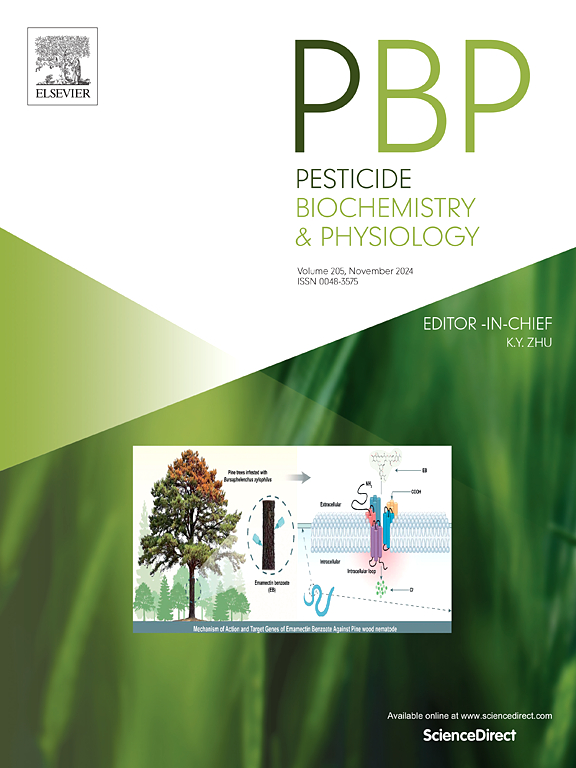Effects of tebuconazole on insecticidal activity and symbionts in brown planthopper, Nilaparvata lugens (Hemiptera: Delphacidae)
IF 4.2
1区 农林科学
Q2 BIOCHEMISTRY & MOLECULAR BIOLOGY
引用次数: 0
Abstract
Harnessing symbionts as targets for pest management is an emerging and promising strategy that can contribute to sustainable agriculture and environmental protection. Brown planthopper (BPH), a major rice pest, significantly threatens crop yields and quality. In this study, we discovered that BPHs exhibited a significant increase in mortality after consuming the fungicide tebuconazole, indicating its direct toxic effect. Tebuconazole negatively impacts the body weight, digestive enzyme activity, and reproductive capacity in BPHs, and it also leads to a significant downregulation of the expression levels of the ecdysteroid biosynthetic genes. The number of symbionts and the expression level of Noda in the BPH treated with tebuconazole was significantly reduced. Sequencing results showed that tebuconazole had a significant effect on the richness of symbiotic fungi and bacteria in BPH. As a fungicide, tebuconazole can offer new approaches and insights for managing resistance and integrated pest control.

求助全文
约1分钟内获得全文
求助全文
来源期刊
CiteScore
7.00
自引率
8.50%
发文量
238
审稿时长
4.2 months
期刊介绍:
Pesticide Biochemistry and Physiology publishes original scientific articles pertaining to the mode of action of plant protection agents such as insecticides, fungicides, herbicides, and similar compounds, including nonlethal pest control agents, biosynthesis of pheromones, hormones, and plant resistance agents. Manuscripts may include a biochemical, physiological, or molecular study for an understanding of comparative toxicology or selective toxicity of both target and nontarget organisms. Particular interest will be given to studies on the molecular biology of pest control, toxicology, and pesticide resistance.
Research Areas Emphasized Include the Biochemistry and Physiology of:
• Comparative toxicity
• Mode of action
• Pathophysiology
• Plant growth regulators
• Resistance
• Other effects of pesticides on both parasites and hosts.

 求助内容:
求助内容: 应助结果提醒方式:
应助结果提醒方式:


